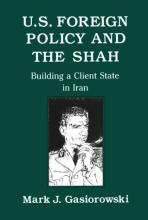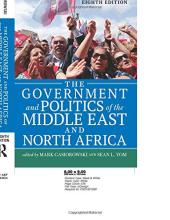Mark Gasiorowski
Professor

Areas of Expertise
Biography
Mark Gasiorowski is a Professor in the Department of Political Science at Tulane University. He received a BA in Mathematics from the University of Chicago in 1976 and a PhD in Political Science from the University of North Carolina in 1984. His scholarly activity focuses primarily on Iran and US-Iran relations. He has published numerous books and articles on these and other topics and has served frequently as a consultant and media commentator on Iran. He has traveled extensively in Iran and elsewhere in the Middle East and North Africa. He was a visiting professor at Tehran University in 1994, 1996, and 1998 and a Visiting Fellow at the Middle East Centre, St. Antony’s College, Oxford University in 2001-2002. He has lived in New Orleans with his wife and daughter for some 20 years. In his spare time he enjoys traveling, hiking, sculpture, and vampire movies.
Education
University of North Carolina
University of Chicago
Accomplishments
Mossadegh Foundation Book Award
October 2004
For Mohammad Mosaddeq and the 1953 Coup in Iran
Certificate of Award (teaching)
1997
Louisiana State University Alpha Delta Lambda Freshman Honor Society
Links
Articles
U.S. Perceptions of the Communist Threat in Iran during the Mossadegh Era
Most studies of the coup d’état in Iran in August 1953—a coup backed by U.S. and British intelligence agencies—attribute it at least partly to U.S. concerns about the threat of a Communist takeover in Iran. This article examines the evidence available to U.S. officials about the nature of the Communist threat in Iran prior to the coup, in the form of reports, analyses, and policy papers written on this subject at the time by U.S. officials. The documentation reveals that U.S. policymakers did not have compelling evidence that the threat of a Communist takeover was increasing substantially in the months before the coup. Rather, the Eisenhower administration interpreted the available evidence in a more alarming manner than the Truman administration had. The coup the administration undertook in response was therefore premature, at best.
The US stay-behind operation in Iran, 1948-1953
This article explains a US initiative to prepare resistance forces for use in the event of a Soviet invasion or communist attempt to seize power in Iran during the early Cold War era. It begins by discussing similar ‘stay-behind’ operations in Europe in this era and the conditions that led US officials to develop one in Iran. It then explains what this stay-behind operation consisted of and why US officials eventually abandoned it. The paper concludes with a discussion of how the stay-behind operation in Iran differed from those in Europe and the important role it played in the decision-making that led to the 1953 coup in Iran.
US Covert Operations toward Iran, February–November 1979: Was the CIA Trying to Overthrow the Islamic Regime?
This article examines US covert operations toward Iran from February until November 1979. It focuses especially on whether the CIA was trying to undermine or overthrow Iran's nascent Islamic regime, as many Iranians believed. The article details the extensive covert contacts the CIA and other US personnel established in this period with Iranian officials and various Iranian opposition factions. Its main conclusion is that US officials established these contacts for the purpose of gathering intelligence about the rapidly changing situation in Iran, rather than to undermine the Islamic regime. Indeed, US personnel never encouraged these Iranian contacts to plot against the regime and often explicitly discouraged them from doing so.
The CIA's TPBEDAMN Operation and the 1953 Coup in Iran
This article gives an overview of TPBEDAMN, a large covert operation the U.S. Central Intelligence Agency (CIA) carried out in Iran for several years in the early 1950s. TPBEDAMN was a psychological warfare operation intended to undermine the influence of the Soviet Union and its Iranian ally, the Communist Tudeh Party, through covert propaganda and political action activities. When U.S. officials decided in early 1953 to overthrow Iran's prime minister, Mohammad Mosaddeq, they relied heavily on TPBEDAMN's large network of Iranian agents and subagents to plan and implement a coup d'état. The overview of TPBEDAMN presented here helps to clarify both the nature of the organizational apparatus the CIA used against Mosaddeq and the broader context within which the coup occurred, especially the intense Cold War climate that prevailed and the prevalence of psychological warfare in this era.
US Intelligence Assistance to Iran, May–October 1979
This article describes a US initiative to provide intelligence to Iran in 1979, as radical Islamists were becoming increasingly powerful there and tensions were escalating with the United States. This initiative began in May 1979, when Prime Minister Mehdi Bazargan and other Iranian officials asked US embassy personnel for information on ethnically based uprisings that threatened the new Islamic regime. It culminated when a CIA officer gave two briefings in mid-October warning Iran's leaders that Iraq was making preparations for a possible invasion of Iran. It ended abruptly in November 1979, when radical Islamist students seized the US embassy in Tehran. Iran's leaders did not heed the US warning and were entirely unprepared for the Iraqi invasion of September 1980, which had a devastating impact.
Media Appearances
Don’t Just Blame Washington for the 1953 Iran Coup
In their Oct. 30 article in Foreign Policy, Roham Alvandi and Mark J. Gasiorowski took issue with my 2010 book Iran and the CIA: The Fall of Mosaddeq Revisited, seeking to link it to the current hostility between Iran and the United States. Their ultimate goal is to rehabilitate a discredited narrative to which the release of the secret CIA files in 2017 has dealt a devastating blow. The archival evidence presented below should enable readers to form an independent judgment about the circumstances of the fateful overthrow of the government of Iranian Prime Minister Mohammad Mosaddeq in August 1953.
Bernie Sanders gives a perfect reason for the US to pull out of endless war in Afghanistan
The CIA-backed coup in Iran in 1953 – as author Mark Gasiorowski says – “[took] out the moderate, secular, element of Iranian politics and enabled radical Islamists”. Historian Mark Curtis, meanwhile, insists that co-conspirator Britain actually manipulated radical Islamist forces to “counter the threat to British interests” from secular progressives.
Misreading The 1953 Coup
The scholarly consensus around the coup has been quite consistent since historian Mark Gasiorowski’s groundbreaking 1987 article. The United States was heavily involved in the coup against Mossadeq. Indigenous factions were instrumental in Mossadegh’s overthrow. But the coup would not have taken place (or, at the very least, would have been significantly delayed) without funding, planning, and encouragement from U.S. officials.
“If things were all good, we would not have had a revolution” – Ambassador Zahedi
According to Mark Gasiorowski, who has written an authoritative book on the Coup and many articles on the subject, “The three official CIA histories of the coup and many memoirs and academic studies have established clearly that the United States and Britain played crucial roles in the coup. Without US and British involvement, the coup would not have occurred how and when it did.”
Trump is reviving the 1953 coup plan against Iran. It won't work twice
The British responded by blockading the export of Iranian oil and imposing other stringent economic sanctions, including, as historian Mark Gasiorowski notes, an embargo "on British exports to Iran of iron, steel, sugar and oil processing equipment". Gasiorowski adds: "Sterling conversion privileges were cancelled and other financial restrictions were imposed which violated a memorandum of understanding between the two governments."




